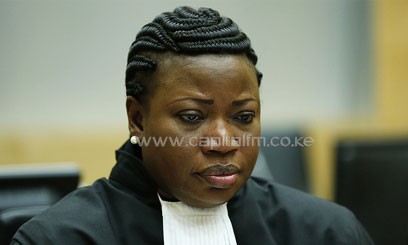
In the appeal, Prosecutor Fatou Bensouda argued that the judges had applied the Rome Statute selectively by allowing Ruto to skip some of the trial sessions/FILE
In the appeal, Prosecutor Fatou Bensouda argued that the judges had applied the Rome Statute selectively by allowing Ruto to skip some of the trial sessions.
“The majority’s “exceptional circumstances” test is therefore inconsistent with the Statute. The majority’s test violates the principle of equal treatment under the law, as expressed in Article 27(1) of the Statute. Furthermore, the majority’s test violates the bedrock legal principle that all persons are to be treated equally under the law,” Bensouda explained.
In her application she asked the Appeals Chamber to overturn the decision by the Trial Chamber to ensure Ruto is present in The Hague during the entire trial session.
She explained that Ruto should not be allowed to skip sessions of his trial on basis that he is the Deputy President of Kenya who has to attend to State duties.
Apart from contravening Article 63(1), which requires the accused to be present during a trial, she argues the decision also accorded Ruto special treatment because of the position he occupies in government.
“It appears that the majority would not have afforded Ruto the same “indulgence” if he did not hold such high office. The importance of Ruto’s political office to the majority’s reasoning is evident on the face of the decision, which references his status no fewer than 29 times,” she asserted.
Bensouda argued that the decision of the Trial Chamber fell out of the provisions of the Rome Statue that makes it mandatory for accused persons to be present during their trial.
“Such a general exception to the rule requiring the accused’s presence at trial finds no support in this Court’s legal framework. The drafters adopted only one exception to the rule, which is inapplicable here, and left trial judges with no “discretion” to create additional broad exceptions of the type advanced in the Decision,” she explained.
According to her the judges used their own ‘reasoning’ – which is outside the court’s provisions – in allowing Ruto to attend some sessions.
“The decision improperly relies on external sources of law rather than this court’s statutory provisions that resolve the issue. The majority erred by relying on external sources of law in support of its decision to disregard the unequivocal requirements of this court’s statute.”
The prosecutor in her appeal further said the decision of the Trial Chamber will affect the integrity of the court since it failed to follow the existing legal framework followed when considering the presence of accused persons during the trial stage.
She expressed concerns that other government officers accused of crimes against humanity can easily take advantage of the decision on Ruto’s presence in court to also seek to be allowed to skip sessions of their trials.
In her view, the decision has set a wrong precedent that is likely to see the court face bigger challenges in future when dealing with persons charged with State duties.
“Even assuming that the majority’s test had a basis in the law of this court, it is still the wrong standard because it invites a flood of excusal applications from accused who do not wish to attend trial. Almost every accused will be able to present a reason why he or she “has important functions of an extraordinary dimension to perform” and should be excused from attending the trial,” she explained.
“While Ruto’s position as Kenya’s Deputy President may ‘make this case different from the average case’ seen so far at the court, it is foreseeable that many future accused will put forward a compelling argument as to why they too should be excused from attending the trial,” she goes on.
Citing the case of Congolese leader Jean-Pierre Bemba, the prosecutor explained that he was absent during his trial only for ‘less than a handful of hours’ hence allowing Ruto to skip sessions of the trial was out of the ordinary in the history of the Hague- based court.
“Bemba was permitted to be absent for a total of three court sessions, plus one where he was absent from the courtroom for a matter of minutes. In total, Bemba has been absent for less than a handful of hours in a trial that is approaching its third anniversary. This is a far cry from the near-blanket waiver the decision grants to Ruto,” she explained.
The Trial Chamber on June 18 ruled that Ruto would be allowed to skip sessions of his trial and outlines sessions that he will be required to be present in court among them during the opening and closing sessions where parties and participants and victims will present their views.
They explained the excusal would allow his prayer to attend to his state duties.











































